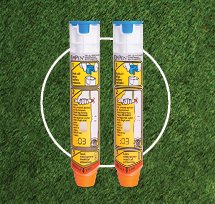Academic pharmacist Nataly Martini provides key information on Helicobacter pylori pathophysiology, diagnosis and evidence-based treatment strategies to enhance patient outcomes
Think Twice
Think Twice

Adrenaline auto-injectors (AAIs) such as EpiPen, deliver adrenaline by means of an auto-injector device for the emergency treatment of anaphylaxis, a life-threatening severe allergic reaction. A recent report by the Commission on Human Medicines’ Adrenaline Auto-injector Expert Working Group highlights the latest safety advice including the recommendations of prescribing two AAIs, and patients should carry these at all times.2
Current clinical guidelines emphasise the significance of having two Adrenaline Auto-Injectors (AAIs) for individuals at risk of anaphylaxis.1*
In accordance with ASCIA (Australasian Society of Clinical Immunology and Allergy) guidelines, it is recommended that it is best to prescribe two Adrenaline Auto-Injectors for individuals at risk of anaphylaxis. For children attending daycare or school, this approach ensures that one Adrenaline Auto-Injector remains with the child at all times, whether at home or outside, while the second one is stored at the daycare or school for additional coverage.1
Similarly, for older children or adults weighing 50 kg or more, having two Adrenaline Auto-Injectors enables individuals to carry both with them at all times.1 This becomes crucial in situations where more than one dose of AAI may be required, offering an added layer of preparedness.1 This could include reasons such as ambulance delays, a biphasic reaction or incorrect administration technique.1,3
In emergency scenarios with potential ambulance delays, it is ideal for individuals at risk of anaphylaxis to have two devices readily available.1 This precautionary measure becomes especially significant as reiterated in the ASCIA Action Plan for Anaphylaxis, which states that further adrenaline may be administered if there is no response after 5 minutes.1
Likewise, the updated guidance from MHRA† in 2023, taking into account the expert findings from CHM‡, underscores the crucial importance of having two AAIs on hand.2,4 It recommends promptly using an AAI if anaphylaxis is suspected, even in cases where doubt exists about the severity of the event, and advocates for using the second AAI when necessary.2,4
The importance of this shift goes beyond mere convenience; it addresses the real-world scenarios that patients with severe allergies encounter. Between 3% and 20% of patients may experience a biphasic reaction needing a second EpiPen.5 This could be particularly relevant for patients that find themselves in a remote location, experience ambulance delays or do not have access to a second device.1,3
EpiPen is fully funded for patients meeting the eligibility criteria, including:
- A patient who has had a previous anaphylactic reaction which required ED visit or hospital admission; OR
- A patient who has had a significant anaphylaxis risk as determined by a relevant practitioner.
General Practitioners, Specialists, Nurse Practitioners, and Pharmacist Prescribers have the ability to request lifelong special authority for these individuals.6
It is also vital that patients check the expiry of their devices and this is where Viatris can help. Upon receiving their EpiPen Auto-Injectors, patients are encouraged to register their devices at myepipen.co.nz. This allows them to receive a free trainer pen and expiry reminders, and provide access to additional resources such as multi-language how to use videos.
In conclusion, Think Twice is about the importance of giving patients access to two EpiPen Auto-Injectors. The shift in prescription practices, from one to two devices where appropriate, reflects a commitment to patient safety and aligns with the evolving understanding of severe allergy management. This change ensures that individuals at risk of anaphylaxis are adequately equipped to face emergency situations, providing peace of mind to both patients and their families.7
*No limit to the number of devices that can be accessed through Te Whatu Ora Hospitals.
†MHR: Medicines and Healthcare products Regulatory Agency
‡CMH: Commission on Human Medicines
1. ASCIA. Adrenaline (Epinephrine) Injectors Frequently Asked Questions (FAQ). 2023. Retrieved from: https://www.allergy.org.au/ Accessed February 2024. 2. Public Assessment Report of the Commission on Human Medicines’ Adrenaline Autoinjector Expert Working Group: Recommendations to support the effective and safe use of adrenaline auto-injectors. Published 11 November 2021.Public Assessment Report: Recommendations to support the effective and safe use of adrenaline auto-injectors - GOV.UK (www.gov.uk) Accessed February 2024. 3. Simons KJ, et al. Adrenaline and its use in anaphylaxis: Current issues. Curr Opin Allergy Clin Immunol. 2010;10:354-361. 4. Adrenaline Auto-Injectors (AAIs) Safety Campaign. Available at: https://aaisafety.campaign.gov.uk/ Accessed February 2024. 5. ASCIA. Acute Management of Anaphylaxis. Available at: https://www.allergy.org.au/hp/papers/acute-management-of-anaphylaxis-guidelines. Accessed February 2024. 6. The Pharmaceutical Management Agency. Available at: www.pharmac.govt.nz. Accessed February 2024. 7. ASCIA. Adrenaline (Epinephrine) Injectors for General Use. Retrieved from https://www.allergy.org.au/hp/anaphylaxis/adrenaline-injectors-forgeneral-use. Accessed February 2024. Mandatories: EPIPEN® (adrenaline 300 mcg/0.3 mL) & EpiPen® Jr (adrenaline 150 mcg/0.3 mL) Auto-Injectors are Restricted Medicines. Indication: For the emergency treatment of anaphylaxis (acute severe allergic reactions) in adults and children ≥ 15 kg. Contraindications: certain types of arrhythmia; cerebral arteriosclerosis; shock; during general anaesthesia with halogenated hydrocarbons or cyclopropane; if vasopressors are contraindicated. Precautions: allergy to sulfites, cardiac dilation, heart disease including cardiac arrythmias, coronary artery disease or insufficiency, hypertension, the elderly, diabetes, narrow angle glaucoma, severe renal impairment, hypercalcaemia, hypokalaemia, hyperthyroidism, psychoneurosis, parkinsonism, asthmatic children, maternal hypertension >130/80. Do not inject into hands, feet, ears, nose, buttocks, genitalia or intravenously. Interactions: sympathomimetic agents, alpha-adrenergic blocking agents such as ergot alkaloids and phentolamine, non-selective beta blockers, digoxin, quinidine, halothane, cyclopropane, trichlorethylene, see data sheet for CNS and other medicines that can potentiate adrenaline. Common Adverse Effects: tachycardia, respiratory difficulty, sweating, pallor, nausea, vomiting, sleeplessness, hallucinations, palpitations, redness of face and skin, psychomotor agitation, impaired memory, angina, potentially fatal ventricular arrhythmias including ventricular fibrilliation, cerebral haemorrhage and pulmonary oedema from severe hypertension, rare cases of stress cardiomyopathy, rare cases of serious skin and soft tissue infections. Dosage & Administration: Administered intramuscularly; Adults ≥ 30 kg: a single EpiPen® delivers 300 mcg; Children 15-30 kg: a single EpiPen® Jr delivers 150 mcg. EpiPen® and EpiPen® Jr are funded medicines, special authority criteria apply. Before recommending this medicine, please refer to full Data Sheet available from www.medsafe.govt.nz. EPIPEN® and MyEpiPen® are Viatris company trade marks, Viatris Limited, Auckland. Copyright© 2024 Viatris Inc. All rights reserved. EPI-2024-0019. TAPS 2303MM-0111




